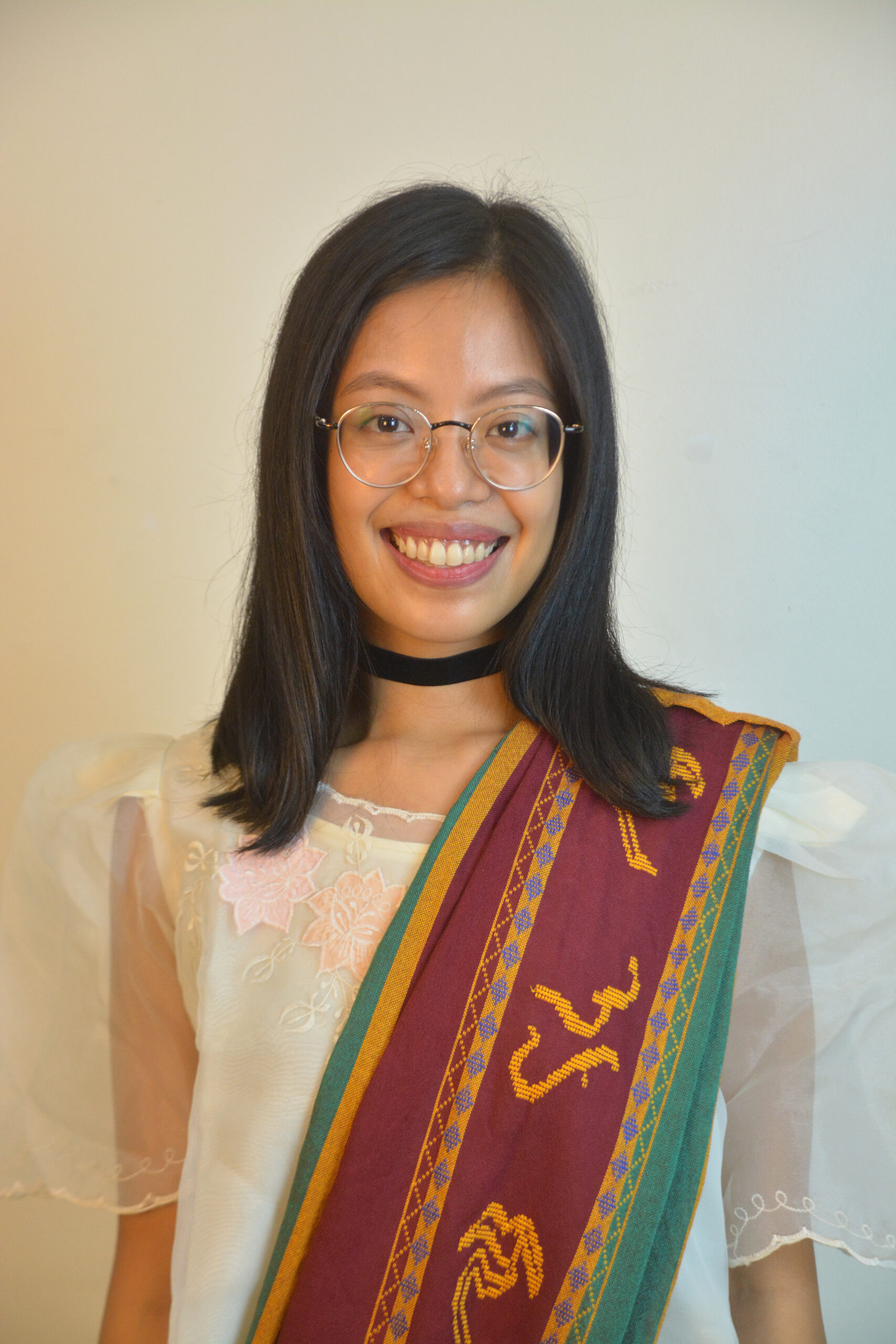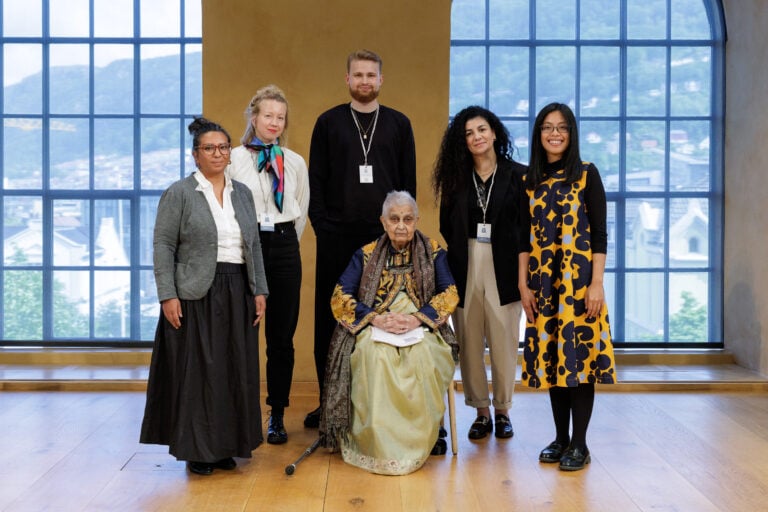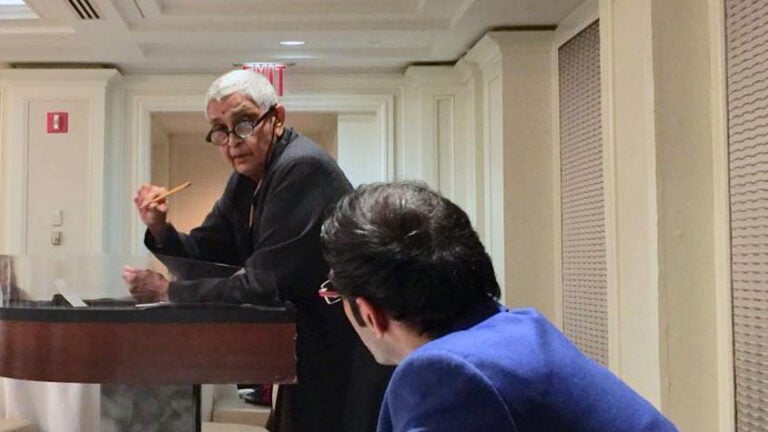Jillian Loise Melchors presentation from the Masterclass with Holberg Laureate Gayatri Chakravorty Spivak on ‘The Practice of Learning’.
All disciplines produce knowledge and the students learn to know. The humanities – literature and philosophy – teach the practice of learning. In knowing, you know an object.
Introduction
On 4 June 2025, Five PhD candidates in the Nordic countries were invited to participate in a Masterclass with Holberg Laureate Gayatri Chakravorty Spivak on ‘The Practice of Learning’. Each of the participants gave a short presentation on the topic based on their research. The text below is a transcript from the presentation Jillian Loise Melchor gave at the event.
“I Know What You Said and I Also Know What I Heard”: Creole Languages and the Case for a Humanistic Linguistics
I am Jillian Loise Melchor, a doctoral candidate at the University of Helsinki working on a research project entitled “Towards a sustainable scholarship and praxis of minority language preservation: decolonising Philippine Chavacano Creole heritage”. So many buzzwords, one can tell I have learned the language of grant applications. But this project actually problematises the terms “decolonial” and “heritage”.
When I first applied for a funded researcher position, I didn’t make the cut. Back then, the title of my project was: “Untangling the coloniality of creole language heritage: Chavacano naming practices, identity alignment, and language revitalisation“. My humanities background must have prompted me to frame my research as a process rather than a direction.
Literature teaches us that the only way forward (not out) is through. To move towards a decolonising —not just a decolonial— practice of creole language preservation, one must go through a process that begins with what Professor Spivak describes as a “turning of the text against itself”.
Linguists, especially creolists who analyse some of the world’s most marginalised languages, must critically reflect on how we practice our discipline. I believe that the humanities can do the science of languages an immense service in this regard.
I pay special attention to creole languages as they are living remnants of the linguistic shock that came with colonial violence. From Tok Pisin in Papua New Guinea, originally spoken by Melanesian laborers interacting with English colonists, to Haitian Kreyòl, spoken by enslaved Africans on Caribbean plantations under French rule, creoles illustrate how language was both a tool and an outcome of colonial intervention.
“Perhaps the most enduring injustice committed to the creole-as-object-of-knowledge is the yet-to-be-fully-eroded epistemological integrity of the notion that it is merely a ‘bastardised’ or ‘degenerate’ version of its colonial lexifier” (Melchor, forthcoming).
Have a native Spanish speaker, unfamiliar with Chavacano, listen to a creole recording. It would likely provoke amused wonder, beneath which might lurk an unease brought about by the uncanny. I imagine it as a sort of linguistic equivalent to the mirror stage, except that the reflection staring back at the child appears somewhat disjointed.
Despite theoretical differences about the nature of creoles, with some linguists categorically declaring them the world’s “simplest languages,” no serious linguist today would suggest that these languages are mere “degenerate offshoots” of their colonial lexifiers. Yet even official institutions perpetuate this bias. A 2018 report by the Commission on Philippine Languages for the United Nations describes Chavacano as “bastardized Spanish”. What is more concerning is that this perception persists even among speakers of Chavacano. One creole speaker, in a 2011 scholarly publication, describes his mother tongue as a “Spanish vulgate,” coarse and rustic, in contrast toCastilian, the language of the colonial elite (Santos 2011).
This is why creoles are among the most historically marginalised of the world’s “wealth of mother tongues” (Spivak 2024): not only because of the violent and sudden rupture that conditioned their emergence, but also because of the cognitive injustice committed against their speakers, who were once deemed too deficient to properly learn the language of their masters.
Writing in the sixteenth century about evangelising the New World, the Jesuit missionary and naturalist José de Acosta, declared: “The indio is irrational; he is, in the final account, animal.” The Creolophone’s “anomalous” speech was cast as further proof that the native was beneath human. The subaltern cannot speak properly. This was the conclusion of the Western observers performing the ethnography of speaking from the eighteenth through the nineteenth century.
If some creole speakers of our time see their own mother tongue as deficient despite their desire for linguistic survival, then linguists must acknowledge that a social imperative lies at the core of our enterprise. When we document an endangered language, we are not only “systematising” speech, we are actively reshaping (for better or for worse) the dynamics of a people among a multitude of peoples.
Generations of empirical linguists have visited remote communities to extract data in order to publish grammars of so-called “exotic” languages, often without reckoning with the inevitable consequences (at times, the unintended repercussions) of language standardisation for the speech communities involved. I don’t intend to downplay the immense value —or, in some cases, the real urgency— of documentation as a means of addressing language endangerment. Yet, for the better part of this scientific tradition, scholars learned how to represent a language without learning from the people who speak it.
“Thankfully, a growing number of scholars are confronted by the basic fact that the languages we study are ultimately embedded in real, human contexts and must therefore not be exploited as if they were abstract properties without material and social consequences” (Melchor, forthcoming).
Going back to the original title of my dissertation “Untangling the coloniality of creole language heritage: Chavacano naming practices, identity alignment, and language revitalisation”: my thesis statement does not predict a potential finding. Inspired by Professor Spivak, I aim to move beyond descriptive knowledge production.
My thesis proposes a reflexive process aimed at fostering a potentially informed practice. I argue that preserving or documenting creoles requires understanding the colonial histories that engendered them, examining the social transformations shaped by these languages and their speakers, and scrutinising how creole knowledge has thus far been produced.
Let me end with a few questions, to which, as yet, I have no answer: What does it really mean to decolonise creole language scholarship?
The core debate in pidgin and creole studies centers on whether “creole” constitutes a valid linguistic category. One side views it as merely a socio-historical label tied to colonialism and racial hierarchies, while the other argues that creoles indeed form a distinct typological category characterised by a “shared lack of features”.
In my PhD, I choose not to engage directly in this debate. Instead, I read this definition of “creole” through a deconstructive lens, drawing from Professor Spivak’s itinerary, questioning, again and again, “what it is that we already know”.
If the defining subset of features that constitute creole languages as a unified “sign” is what these systems are understood to lack, then the meaning of the sign “creole” is constructed upon that which is absent rather than that which is present.
This reveals that Creolistics’ foundational query remains entrenched in the creole’s relationship with its colonial lexifier. What the colonial language has —or doesn’t lack— marks a meaningful absence in the creole. The debate hence exposes the near impossibility of a creole-lexifier epistemic decoupling.
Another query: Is decolonisation the primary means to seek cognitive justice in creole linguistics?
Top-down decolonisation demands de-linking Chavacano from Spanish to challenge lingering colonial biases that uphold creole inferiority. Yet several Chavacano speakers reclaim their mother tongue not by “rejecting their colonial past, and all its attendant racialised discourses, but by reframing colonial intervention as the locus of their unique heritage” (Melchor 2025).
If the role of the scholar is that of a mediator, how can a linguist negotiate these tensions, especially among speakers whom we cannot assume or expect to homogeneously and simultaneously desire linguistic survival and epistemic equality?
I am reminded of Professor Spivak’s (2016) essay on the willing suspension of disbelief of the colonial subject who utters: “I know what you said and I also know what I heard.”
The language name “Chavacano” derives from an archaic Spanish adjective meaning “something executed in an unpolished manner, without corresponding mastery; anything unworthy of praise or recognition is chabacano” (Melchor & Blázquez-Carretero 2022). Suspending knowledge of the depreciative origin that history has bestowed upon her mother tongue, a post-colonial creole speaker proudly declares, in standard Spanish:
“I love Spanish very much because it is the base language of my native language, which is Chabacano … I would really like to learn more and deepen my understanding of the Spanish language. I consider Spanish to be very elegant, just like Chabacano, as both languages are on par with each other.” (Márquez 2020)
References
Acosta, José de. 1575–76 [1984]. De procuranda indorum salute: pacificación y colonización. Madrid: CSIC Press.
DeGraff, Michel. 2005. Linguists’ most dangerous myth: The fallacy of Creole exceptionalism. Language in Society 34(4). 533–91.
Márquez, Florencia F. 2020. Mi hermosa experiencia con la lengua española. Revista Filipina (7)1. 39–40. https://revista.carayanpress.com/resources/FFMarquez-Web.pdf.
Melchor, Jillian Loise & Miguel Blázquez-Carretero. 2022. Zamboanga Chavacano: From español de cocina to un poquito español. A postcolonial inquiry into creole language preservation. Journal of Pidgin and Creole Languages 37(1). 72–113.
Melchor, Jillian Loise. 2025. What do we talk about when we talk about Chavacano? Language names in the archaeology of knowledge. Journal of Pidgin and Creole Languages.
Melchor, Jillian Loise. (Forthcoming). Towards a (critical) genealogy of creole language: revisiting the Philippine Chavacano Creoles. In Levisen, C. & Sippola, E. (Eds.). Routledge Handbook of Postcolonial and Decolonial Linguistics.
Santos, Rolando A. 2011. Chavacano de Zamboanga. In Selected Papers from Philippine-Spanish Friendship Day Conferences, 2010, 134–42. Manila, Philippines: NationalHistorical Commission of the Philippines.
Spivak, Gayatri Chakravorty. 2024. Teaching for a Broken World. ANGLICA-An International Journal of English Studies, 33(3), pp.11-26.
Spivak, Gayatri Chakravorty. 2016. Willing Suspension of Disbelief, Here, Now. In: Khalip, J. and Pyle, F. ed. Constellations of a Contemporary Romanticism. New York, USA: Fordham University Press, pp. 309-322. https://doi.org/10.1515/9780823271061-015
Last edited:
Published:
About the author
Jillian Loise Melchor
 Jillian Loise Melchor. (Photo: Private.)
Jillian Loise Melchor. (Photo: Private.)
Jillian Loise Melchor is a PhD candidate at the University of Helsinki, developing decolonial paradigms for the study and preservation of creole language heritage. She authored Colonial Philippines in Italian Travel Writing (2024) and has published on the entanglements of language and power.
Framed within the Spivakian sense of representation, even in the description of her speech, the subaltern is rendered mute. Indeed, the most enduring injustice committed to the creole-as-object-of-knowledge is the yet-to-be-fully-eroded epistemic integrity of the notion that a Creole is merely a “bastardised” or “degenerate” version of its colonial lexifier. It is at this juncture that critical theory must supplement linguistics, especially since the science of languages lags behind sister disciplines in its Lacanian apperception notwithstanding the deeply colonial origins of this discipline and the immense value of language as a site of colonial power.
Related content

Staging Silence: Subalternity, Imaginative Activism, and the Limits of Historiography
Johannes Sartous presentation from the Holberg Masterclass with Gayatri Spivak on 'The Practice of Learning'.

Representation and Responsibility: A Perspective on the Practice of Learning
Sabina Ivenäs' presentation from the Holberg Masterclass with Gayatri Chakravorty Spivak on 'The Practice of Learning'.

The Holberg Masterclass with Gayatri Chakravorty Spivak: ‘The Practice of Learning’
All disciplines produce knowledge and the students learn to know. The humanities – literature and philosophy – teach the practice of…

